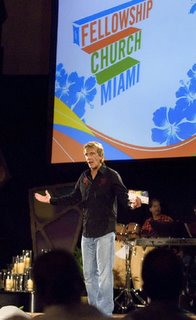
By Thabiti Anyabwile
The Dallas Morning News featured an article on the grand opening of Ed Young's new church in Miami, FL. Many of you will know Ed Young as the very popular pastor of the Fellowship Church in Grapevine, TX.
The article was interesting because it detailed a growing trend among some megachurch pastors and leaders: satellite churches at long distances from the "home" church. Satellite campuses have been around for a long time. I've talked a little bit about the technology used in this approach and some implications elsewhere. What's interesting and new about this phenomena is that now some pastors are crossing state lines, time zones and entire continents to create "franchises."
Fellowship Church boasts weekly attendance of about 18,000 at its main campus in
Grapevine. Another 5,000 attend sites in Plano, Justin and the downtown Dallas art district. The article featured Ed Young, but a number of other similar operations were profiled as well:
Lifechurch, led by the Rev. Craig Groeschel, started in Edmond, Okla. It now has four Oklahoma sites, one in Arizona, one in Tennessee, and one in Fort Worth.
NewSong Church, led by the Rev. Dave Gibbons, may set the record for distance, with four sites in Southern California and one in Bangkok, Thailand – and plans to build in India, London and Dallas
The writer, picking up on the typical multi-site church slogan, "One church, multiple locations," asks a critical question: "But what does it mean to be "one church," spread across hundreds or thousands of miles?" Good question.
This model of doing church calls into question all of our assumptions about pastoral ministry. It calls into question whether the relationship between pastor and congregation is at all essential. It begs the question of whether preaching really is central to our gatherings (at least live preaching from a flesh-and-blood preacher). And I'm curious about the approach to governance or polity used by such churches. How is a group in Bangkod involved in the decisions of groups in Southern California?
Rev. Geoff Surratt, co-author of The Multi-Site Church Revolution and a pastor at Seacoast Church, a church with six sites in Georgia and one in South Carolina, makes this case for multi-sites over and against traditional church planting: "Multisite locations grow faster, reach a place of health and are self-sustaining much faster than traditional church plants."
As far as I can tell, the jury is still out on that contention and there is nowhere near a significant enough number of such churches to actually assess the benefit or harm. Moreover, fast growth and self-sustaining wouldn't be at the top of my list for reasons to adopt this strategy. "Healthy congregation" might, but then the critical issue is what's meant by "healthy." Franchising a personality, selling his favorite oatmeal cookies along with his most recent book, and fostering absentee pastors doesn't readily strike me as healthy for the local church.
I guess central for me is this question: Why franchise an individual pastor in this way? I can understand how one might have satellite campuses in the same metropolitan city/area, and how a pastor and elders may be able to serve that church faithfully. I can't quite fathom why a local church pastor should be "godcast" each Sunday to a location 1,400 miles away.
Two things seem troublesome about that at its core. First, it would seem to promote a celebrity culture and idolization in the people of God as they gather to hear each Sunday--not a local pastor pouring out his life for a people that he lives with--but a "superstar preacher" being beamed in from some remote location. Second, it would suggest (and I want to be careful not to assign motive where I can't see a person's heart) that the person's approach to ministry makes spread of "our" message, appeal, method, and personality far too central to the work of the kingdom. It hints at the kind of pride that says "we're the ones who have it right and our guy is king, so let's export our guy to the ends of the world." It runs the risk of confusing the messenger with the message and building a business empire upon them both.
No comments:
Post a Comment